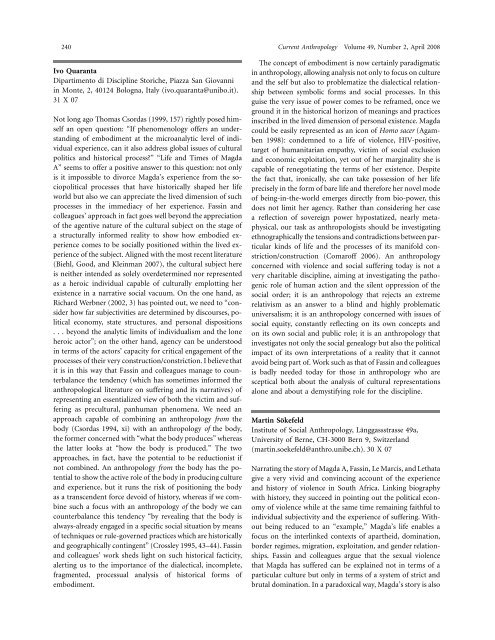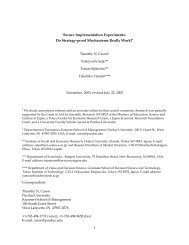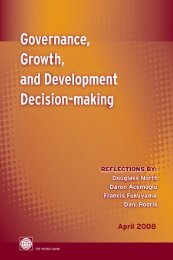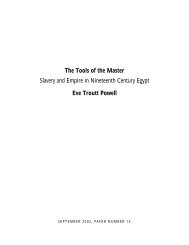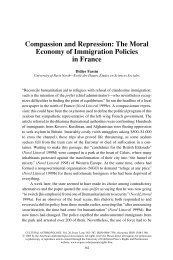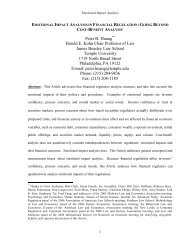Life & Times of Magda A: Telling a Story of Violence in South Africa
Life & Times of Magda A: Telling a Story of Violence in South Africa
Life & Times of Magda A: Telling a Story of Violence in South Africa
You also want an ePaper? Increase the reach of your titles
YUMPU automatically turns print PDFs into web optimized ePapers that Google loves.
240 Current Anthropology Volume 49, Number 2, April 2008<br />
Ivo Quaranta<br />
Dipartimento di Discipl<strong>in</strong>e Storiche, Piazza San Giovanni<br />
<strong>in</strong> Monte, 2, 40124 Bologna, Italy (ivo.quaranta@unibo.it).<br />
31 X 07<br />
Not long ago Thomas Csordas (1999, 157) rightly posed himself<br />
an open question: “If phenomenology <strong>of</strong>fers an understand<strong>in</strong>g<br />
<strong>of</strong> embodiment at the microanalytic level <strong>of</strong> <strong>in</strong>dividual<br />
experience, can it also address global issues <strong>of</strong> cultural<br />
politics and historical process?” “<strong>Life</strong> and <strong>Times</strong> <strong>of</strong> <strong>Magda</strong><br />
A” seems to <strong>of</strong>fer a positive answer to this question: not only<br />
is it impossible to divorce <strong>Magda</strong>’s experience from the sociopolitical<br />
processes that have historically shaped her life<br />
world but also we can appreciate the lived dimension <strong>of</strong> such<br />
processes <strong>in</strong> the immediacy <strong>of</strong> her experience. Fass<strong>in</strong> and<br />
colleagues’ approach <strong>in</strong> fact goes well beyond the appreciation<br />
<strong>of</strong> the agentive nature <strong>of</strong> the cultural subject on the stage <strong>of</strong><br />
a structurally <strong>in</strong>formed reality to show how embodied experience<br />
comes to be socially positioned with<strong>in</strong> the lived experience<br />
<strong>of</strong> the subject. Aligned with the most recent literature<br />
(Biehl, Good, and Kle<strong>in</strong>man 2007), the cultural subject here<br />
is neither <strong>in</strong>tended as solely overdeterm<strong>in</strong>ed nor represented<br />
as a heroic <strong>in</strong>dividual capable <strong>of</strong> culturally emplott<strong>in</strong>g her<br />
existence <strong>in</strong> a narrative social vacuum. On the one hand, as<br />
Richard Werbner (2002, 3) has po<strong>in</strong>ted out, we need to “consider<br />
how far subjectivities are determ<strong>in</strong>ed by discourses, political<br />
economy, state structures, and personal dispositions<br />
. . . beyond the analytic limits <strong>of</strong> <strong>in</strong>dividualism and the lone<br />
heroic actor”; on the other hand, agency can be understood<br />
<strong>in</strong> terms <strong>of</strong> the actors’ capacity for critical engagement <strong>of</strong> the<br />
processes <strong>of</strong> their very construction/constriction. I believe that<br />
it is <strong>in</strong> this way that Fass<strong>in</strong> and colleagues manage to counterbalance<br />
the tendency (which has sometimes <strong>in</strong>formed the<br />
anthropological literature on suffer<strong>in</strong>g and its narratives) <strong>of</strong><br />
represent<strong>in</strong>g an essentialized view <strong>of</strong> both the victim and suffer<strong>in</strong>g<br />
as precultural, panhuman phenomena. We need an<br />
approach capable <strong>of</strong> comb<strong>in</strong><strong>in</strong>g an anthropology from the<br />
body (Csordas 1994, xi) with an anthropology <strong>of</strong> the body,<br />
the former concerned with “what the body produces” whereas<br />
the latter looks at “how the body is produced.” The two<br />
approaches, <strong>in</strong> fact, have the potential to be reductionist if<br />
not comb<strong>in</strong>ed. An anthropology from the body has the potential<br />
to show the active role <strong>of</strong> the body <strong>in</strong> produc<strong>in</strong>g culture<br />
and experience, but it runs the risk <strong>of</strong> position<strong>in</strong>g the body<br />
as a transcendent force devoid <strong>of</strong> history, whereas if we comb<strong>in</strong>e<br />
such a focus with an anthropology <strong>of</strong> the body we can<br />
counterbalance this tendency “by reveal<strong>in</strong>g that the body is<br />
always-already engaged <strong>in</strong> a specific social situation by means<br />
<strong>of</strong> techniques or rule-governed practices which are historically<br />
and geographically cont<strong>in</strong>gent” (Crossley 1995, 43–44). Fass<strong>in</strong><br />
and colleagues’ work sheds light on such historical facticity,<br />
alert<strong>in</strong>g us to the importance <strong>of</strong> the dialectical, <strong>in</strong>complete,<br />
fragmented, processual analysis <strong>of</strong> historical forms <strong>of</strong><br />
embodiment.<br />
The concept <strong>of</strong> embodiment is now certa<strong>in</strong>ly paradigmatic<br />
<strong>in</strong> anthropology, allow<strong>in</strong>g analysis not only to focus on culture<br />
and the self but also to problematize the dialectical relationship<br />
between symbolic forms and social processes. In this<br />
guise the very issue <strong>of</strong> power comes to be reframed, once we<br />
ground it <strong>in</strong> the historical horizon <strong>of</strong> mean<strong>in</strong>gs and practices<br />
<strong>in</strong>scribed <strong>in</strong> the lived dimension <strong>of</strong> personal existence. <strong>Magda</strong><br />
could be easily represented as an icon <strong>of</strong> Homo sacer (Agamben<br />
1998): condemned to a life <strong>of</strong> violence, HIV-positive,<br />
target <strong>of</strong> humanitarian empathy, victim <strong>of</strong> social exclusion<br />
and economic exploitation, yet out <strong>of</strong> her marg<strong>in</strong>ality she is<br />
capable <strong>of</strong> renegotiat<strong>in</strong>g the terms <strong>of</strong> her existence. Despite<br />
the fact that, ironically, she can take possession <strong>of</strong> her life<br />
precisely <strong>in</strong> the form <strong>of</strong> bare life and therefore her novel mode<br />
<strong>of</strong> be<strong>in</strong>g-<strong>in</strong>-the-world emerges directly from bio-power, this<br />
does not limit her agency. Rather than consider<strong>in</strong>g her case<br />
a reflection <strong>of</strong> sovereign power hypostatized, nearly metaphysical,<br />
our task as anthropologists should be <strong>in</strong>vestigat<strong>in</strong>g<br />
ethnographically the tensions and contradictions between particular<br />
k<strong>in</strong>ds <strong>of</strong> life and the processes <strong>of</strong> its manifold constriction/construction<br />
(Comar<strong>of</strong>f 2006). An anthropology<br />
concerned with violence and social suffer<strong>in</strong>g today is not a<br />
very charitable discipl<strong>in</strong>e, aim<strong>in</strong>g at <strong>in</strong>vestigat<strong>in</strong>g the pathogenic<br />
role <strong>of</strong> human action and the silent oppression <strong>of</strong> the<br />
social order; it is an anthropology that rejects an extreme<br />
relativism as an answer to a bl<strong>in</strong>d and highly problematic<br />
universalism; it is an anthropology concerned with issues <strong>of</strong><br />
social equity, constantly reflect<strong>in</strong>g on its own concepts and<br />
on its own social and public role; it is an anthropology that<br />
<strong>in</strong>vestigates not only the social genealogy but also the political<br />
impact <strong>of</strong> its own <strong>in</strong>terpretations <strong>of</strong> a reality that it cannot<br />
avoid be<strong>in</strong>g part <strong>of</strong>. Work such as that <strong>of</strong> Fass<strong>in</strong> and colleagues<br />
is badly needed today for those <strong>in</strong> anthropology who are<br />
sceptical both about the analysis <strong>of</strong> cultural representations<br />
alone and about a demystify<strong>in</strong>g role for the discipl<strong>in</strong>e.<br />
Mart<strong>in</strong> Sökefeld<br />
Institute <strong>of</strong> Social Anthropology, Länggassstrasse 49a,<br />
University <strong>of</strong> Berne, CH-3000 Bern 9, Switzerland<br />
(mart<strong>in</strong>.soekefeld@anthro.unibe.ch). 30 X 07<br />
Narrat<strong>in</strong>g the story <strong>of</strong> <strong>Magda</strong> A, Fass<strong>in</strong>, Le Marcis, and Lethata<br />
give a very vivid and conv<strong>in</strong>c<strong>in</strong>g account <strong>of</strong> the experience<br />
and history <strong>of</strong> violence <strong>in</strong> <strong>South</strong> <strong>Africa</strong>. L<strong>in</strong>k<strong>in</strong>g biography<br />
with history, they succeed <strong>in</strong> po<strong>in</strong>t<strong>in</strong>g out the political economy<br />
<strong>of</strong> violence while at the same time rema<strong>in</strong><strong>in</strong>g faithful to<br />
<strong>in</strong>dividual subjectivity and the experience <strong>of</strong> suffer<strong>in</strong>g. Without<br />
be<strong>in</strong>g reduced to an “example,” <strong>Magda</strong>’s life enables a<br />
focus on the <strong>in</strong>terl<strong>in</strong>ked contexts <strong>of</strong> apartheid, dom<strong>in</strong>ation,<br />
border regimes, migration, exploitation, and gender relationships.<br />
Fass<strong>in</strong> and colleagues argue that the sexual violence<br />
that <strong>Magda</strong> has suffered can be expla<strong>in</strong>ed not <strong>in</strong> terms <strong>of</strong> a<br />
particular culture but only <strong>in</strong> terms <strong>of</strong> a system <strong>of</strong> strict and<br />
brutal dom<strong>in</strong>ation. In a paradoxical way, <strong>Magda</strong>’s story is also


